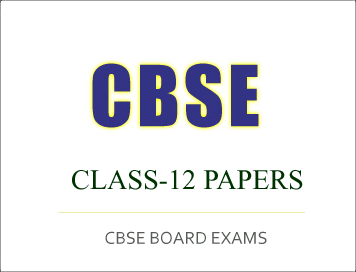CBSE Class-12 Question Papers for IOP/Comptt Examination 2017 : All India Scheme, Legal Studies
Disclaimer: This website is NOT associated with CBSE, for official website of CBSE visit - www.cbse.gov.in

CBSE Class-12 Question Papers for IOP/Comptt Examination 2017 :
All India Scheme, Legal Studies
CBSE Class-12 Question Papers for IOP/Comptt Examination 2017 : Legal Studies
General Instructions :
(i) There are 30 questions in all.
(ii) All questions are compulsory.
(iii) Questions number 1 to 8 are multiple choice questions carrying 1 mark each.
(iv) Questions number 9 to 14 are short answer questions carrying 2 marks each. Answer to each of these should not exceed 50 words.
(v) Questions number 15 to 20 are short answer questions carrying 4 marks each. Answer to each of these should not exceed 100 words.
(vi) Questions number 21 to 24 are long answer questions carrying 5 marks each. Answer to each of these should not exceed 150 words.
(vii) Questions number 25 to 30 are long answer questions carrying 6 marks each. Answer to each of these should not exceed 200 words.
1. Nidhi was appointed for the post as specified under Article 76 of the Indian Constitution. Her duty is to give advice to the Government of India upon legal matters. She can also take part in proceedings of the Parliament without a right to vote. Identify
the post for which she has been appointed.
(a) Advocate General
(b) Attorney General of India
(c) High Court Judge
(d) Supreme Court Judge
2. This tort does not care about the intention or carelessness of the defendant when the defendant caused the injury. The defendant could be responsible for the damage caused even if the defendant has exercised reasonable care to prevent the harm. The tort mentioned here is :
(a) Tort of negligence
(b) Tort of strict liability
(c) Tort of conversion
(d) Intentional tort
3. Praneet transferred his shares to his wife Shalika and the value of the shares is ₹ 500. In the above given situation, the transfer
(a) Requires compulsory registration irrespective of the value of the property as shares are intangible property.
(b) Does not require registration as in case of transfer of shares, transfer has to be made only by delivery.
(c) Require registration as shares are tangible property and it requires compulsory registration.
(d) Does not require registration as the value of property is less than ₹ 1,000.
4. The Criminal Law in India does not take into account ____ in affixing criminal liability or in determining criminal culpability.
(a) Intention (Mens Rea)
(b) Commission of an Act (Actus Reas)
(c) Motive
(d) Attempt
5.‘Law of Mosses’ relates to which of the following ?
(a) If the creditor took his poor debtors’ cloak in pledge, he must return it by nightfall, otherwise he would have no covering for the night.
(b) It is to prevent the strong from oppressing and exploiting the weak.
(c) Each person should have an equal right to the system of equal basic liberties.
(d) It attempts to limit the charges made for the services to poor men providing an instance wherein a surgeon can exact subjectively from the poor and the rich.
6. Directive Principles of State Policy are provided under which part and under which article/s of the Indian Constitution ?
(a) Part IV, Article 37-51A
(b) Part IV A, Article 36-51
(c) Part IV, Article 36-51
(d) Part IV, Article 36-51A
7. The Chairman of District Legal Services Authority is
(a) Judge of High Court
(b) Chief Justice of concerned High Court
(c) District Judge
(d) Advocate General
8. Madhur belongs to a religious minority and in order to promote his religion, he wants to establish an educational institution. Under which article of Indian Constitution Madhur has the right to establish an educational institution ?
(a) Article 25
(b) Article 26
(c) Article 30
(d) Article 29